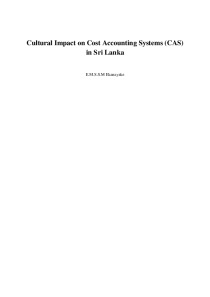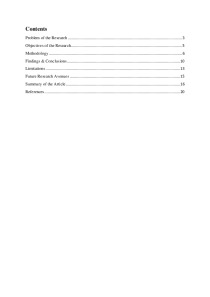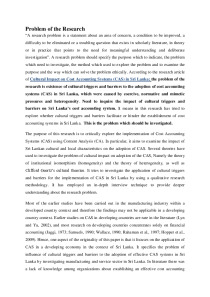Cultural Impact On Cost Accounting Systems In Sri Lanka



Problem of the Research. Objectives of the Research. Methodology. Findings & Conclusions. Limitations. Future Research Avenues. Summary of the Article. References.
This research is an inquiry to examine the application of triggers and barriers for the implementation of Cost Accounting System in Sri Lanka. For examining purpose, they have mainly used qualitative methodology but in data analyzing part they have employed one quantitative method which also a part in a qualitative method. This study has used an in-depth interview technique to get deeper understanding about cultural phenomena. This technique involves face to face contact so that it helps to get more benefits like, avoid misunderstandings between investigator and the interviewee, as well as the investigator gets a chance to clarify his questions to the interviewee to get more accurate and reliable answers relating to the various aspects of Cost Accounting Systems adoption in Sri Lanka and also the investigator can explain topics to the interviewee in depth by discuss it with more details. Interview techniques have provided successful qualitative data and generate new insights into the aspects of Cost Accounting System adoption for the research.
The first author visited to Sri Lanka and spent four months conducting in-depth face-to-face interviews with the selected participants during the time of December 2013 to March 2014. In December 2013 visit; the potential respondents had initially contracted via telephone and e-mail. Appointments were made with those who were interested in participating for the research and some schedules were cancelled and rearranged because some of the respondents were busy professionals. Nevertheless, all the interviews and data collection were carried out within these four months.
The following table shows you the detailed information on the time spent by the investigator with each of the interviewee in Sri Lanka during the time of January-March 2012.
Each of the interview took 126 minutes of average time and this time covers different areas in Cost Accounting Systems like initial introduction to the issues of Cost Accounting System adoption in Sri Lanka, confidentially and ethical issues of the research, the coverage of anonymity and different explanations like What constitutes cost accounting systems, the link between cost accounting system and the managerial process and What cultural triggers and barriers. However, this study employed qualitative research methodology to acquire an initial inquiry in deeper comprehension of underlying cultural reasons and motivation to develop potential hypothesis to be researched by using qualitative research later. The sample size of the qualitative research methodology (phenomenology paradigm) relatively small in number, because of that, the final findings of the research cannot be used to generalize to the wider population or the other countries.
This study not only concern about the sample variation but also concern about improving the research credibility by using different steps. According to those steps, Researchers have used specific filtering procedure to gather useful data for the research by allowing participants to involve with the research if they are genuinely interested in taking part in the research, Participants were encouraged to make a positive relationship with the researchers at the beginning of the interviews, Independent status and anonymity of the respondents were emphasized by the researchers, Employed preventative strategy including triangulating iterative question to minimize and uncover unreliable and contradictory answers during the interview, Used probing approach to detect non-credible and contradictory data and finally, frequent debriefing session were carried out with the respondent’s superior or chief executive officers of the institutions involved, which contributed to an optimal data collection.
- Accounting Term papers
- Microsoft Word 49 KB
- 2021 m.
- English
- 20 pages (5676 words)
- University
- Shripali
















